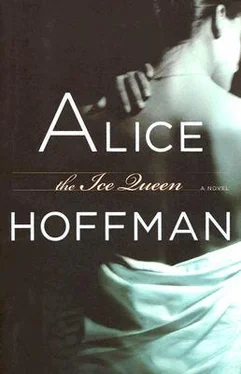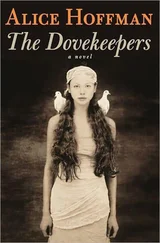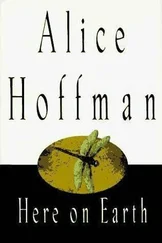“Very funny.”
My brother appeared older now that he’d begun to lose his hair, but when I looked more closely, he was still the same.
“Seriously. Fruit bats. Over by the hibiscus.”
The tall hedge covered with large colorless flowers.
“Is that what that is? Hibiscus?” I leaned my head back, too. A black cloud flitted across the sky. Bats. “Shit. You’re right.”
“You don’t have to worry. You don’t have hair anymore. Long hair,” he corrected when I glared.
“What about you?” I said. Charming me. “You have less.”
Ned ignored the remark. He always did that, left you hanging with your own nastiness. “And you’re not wearing red or yellow. That’s what they’re attracted to.”
“Shoo.” I clapped my hands. My grandmother always told me that would keep bats away. The noise echoed and they left you alone. But the bats in my yard actually came closer.
“They think you’re calling to them,” my brother said. “They hear it as a love song. That’s why they smack into the engines of planes. They think they’re being seduced by some huge horny bat made out of metal and then — kaboom — crushed, mashed, and decimated.”
Proof of my theory: Love destroyed you.
I couldn’t help but think of Nina, that book in her hands, her nightgown, her bare feet, the way she looked right through me.
“If I knew a secret,” I asked Ned, “would you want me to tell you?”
“A riddle, right?” He grinned. He liked games. The more mathematical the better.
“No. I really want to know, Ned. Would you?”
My brother thought this over. He was wearing a sport shirt and chinos. I hadn’t made it to his and Nina’s wedding. My grandmother had already been ailing, and I hadn’t wanted to leave her, but now I wished I’d managed to attend.
Ned had thought enough. “Secrets are only knowledge that hasn’t yet been uncovered,” he told me. “Therefore, they’re not in fact secrets, but only unrealized truth.”
“Bullshit.” I snorted and looked up at the bats.
“Is this about your health?” Ned asked. “Because if that’s what it is, maybe I should know.”
We looked at each other. We were both extremely cautious people. We’d learned the lessons of our childhood. Ask questions, only not too many. Look before you leap. Buy new tires. Be careful whom you love.
“I’m just wearing the heart monitor for my cardiologist’s peace of mind. I’m fine. I skip a beat. Who cares? I get to take this contraption off in the morning.”
Ned looked relieved. I suppose he still felt responsible. He didn’t need to, but he did.
“Now that I know you’re all right,” he said, “I just want to look at the sky.”
Sitting there with my brother, I realized how little we knew about each other; we were like strangers who’d been forced into the same ditch during some vicious, bloody war, and as soon as it was over, we’d gone our separate ways. For an instant I felt like crying. Whenever our mother went out with her friends, Ned would read to me. I always begged for fairy tales, which he’d claimed to despise. I’d thought he read to me only to keep me from whining, to shut me up so I’d go to sleep. Now I wondered if he’d felt responsible back then, if he’d needed comfort as well. I wondered if he’d also wanted to hear those stories.
“If she came back, would we recognize her?” my brother asked.
A funny question from him. I didn’t think he wondered about such things.
“We’d know her anywhere.” I sounded convinced. But in fact I wondered about that myself. If our mother wandered out from behind the hedge right now, she’d still be thirty, her long blue scarf wrapped around her, her high-heeled boots, her pale hair. Why are you sitting in the dark? You aren’t reading, are you? You’ll ruin your eyes. You’ll never get to sleep that way.
I stretched out my legs in the prickly grass. My lawn was the sort of disaster no one could fix. “We’d know her,” I said. “I think.”
“I suppose we would,” my brother agreed.
“So, are you sure you don’t want to know any secrets?” Did I mean whether or not we’d truly know our own mother, lost so long ago, or who I was deep inside, or what his wife was reading when all the lights were out?
“Do you?”
“You have secrets?” I was surprised. Ned had always seemed clear to me in some way, perfectly knowable, logical, a piece of emotional glass.
“Unknown truths,” my brother joked. “At least to you. Known to me, of course. At least in theory. What I know and what I don’t know, I’m not sure I can be the judge of that.”
“Oh, forget it.” I was annoyed, the way I’d been with him when we were children and he seemed more interested in bats, ants, stars, blowflies, theorems, than in human beings. I got up and folded my lawn chair. “Thanks for stopping by. My cardiologist, the worrywart, told me to get a good night’s sleep. Maybe I should listen to him for once.”
“I was thinking about the Dragon today,” my brother said. “I never got the chance to interview him.”
“The old man in Jacksonville? The one who died twice?”
I felt guilty about my current secret life with a dead man. But then, my brother didn’t want to know any secrets, so he wouldn’t have wanted to know about Lazarus Jones.
“It would have been fascinating — just as an incident. I’ve tried to contact him three times for our study. He doesn’t have a phone. I guess I should give up, the way we did with that Jones character. Chased Sam Wyman off his property with a gun.”
I wanted to get the conversation back around to the Dragon.
“So, go see the Dragon. You’re not the one who gives up. You never do. That’s me.”
“Oh, right,” my brother said. “Miss Chickenshit.”
“Mr. Bullshit,” I said right back. It was the way we used to talk to each other, and it was far more comfortable than being polite. It made me miss my childhood. Of all things. I started up toward the porch. I didn’t especially want to discuss men who’d died and come back to life. Not with Ned.
“You’d better run.” My brother grinned and pointed to the bats in a cloud up above. “Woo-hoo! They might come after you.”
“You are so mean.” I started to trot, the lawn chair over my shoulder hitting against my ribs. So, I was still nervous about bats, big deal. My brother got up and closed his lawn chair, then followed me to the porch, where we deposited the chairs into a pile of lawn furniture. The porch was a mess, like the rest of my life. Garbage pails. Tools left behind by the previous tenant. Umbrellas. An old orange crate on its side in which Giselle liked to sleep. My brother spied the shoebox. He would.
“What’s this?” He opened the box; there was the little leaf of a mole. Dry and ashy now. Bone and fur. “You tried to save something,” Ned said.
I laughed. How mistaken my poor brother was. “Idiot. Can’t you see? I killed it.”
Ned went into the kitchen and came back with a serving spoon. I traipsed after him to the hedge, where he intended to dig a little grave. There were beetles flying about. There was the scent of oranges, even here, miles away from any of the orchards. The circle of bats was high in the sky. They looked as though they could reach the moon.
My brother’s knees creaked when he knelt down on the ground. He was thirteen years older than my mother had been on the night she died. He finished digging the grave in no time. He was efficient. Always had been.
Ned took the mole out of the shoebox and placed it in the earth, then covered the body with several hibiscus leaves. I realized I was crying, something I hadn’t done at my own mother’s funeral. When I deposited my heart monitor at the cardiologist’s office in the morning, my doctor would most likely find a spike at exactly this hour. The hour when my brother and I buried something together while the bats flew overhead. The time when I felt something.
Читать дальше












